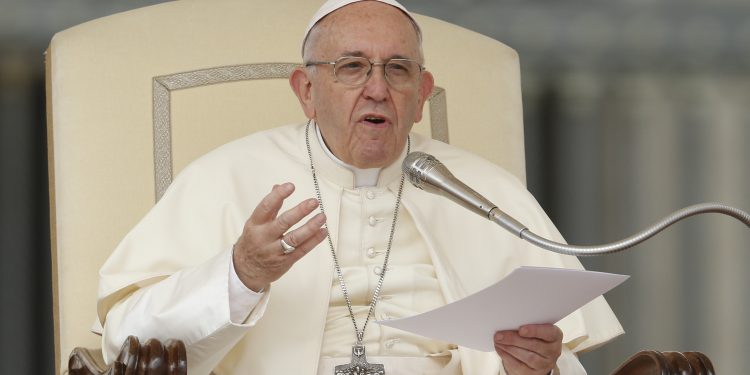Pope Francis and the Death Penalty

On August 1, Pope Francis approved a change to one paragraph in the section of the Catechism of the Catholic Church (2267) dealing with the death penalty and he instructed the Prefect of the CDF (The Congregation for the Doctrine of the Faith), Luis Cardinal Ladaria, to promulgate this revision along with an explanatory commentary in the form of a letter to all the bishops of the world that Pope Francis approved to clarify what His Holiness both did and said in the revision.
Judging by what I am reading in the blogosphere, there are many misapprehensions about this revision. Let’s take a look at it, shall we?
First, let’s look at what the Catechism said before the change:
Assuming that the guilty party’s identity and responsibility have been fully determined, the traditional teaching of the Church does not exclude recourse to the death penalty, if this is the only possible way of effectively defending human lives against the unjust aggressor.
If, however, non-lethal means are sufficient to defend and protect people’s safety from the aggressor, authority will limit itself to such means, as these are more in keeping with the concrete conditions of the common good and more in conformity to the dignity of the human person.
Today, in fact, as a consequence of the possibilities which the state has for effectively preventing crime, by rendering one who has committed an offense incapable of doing harm – without definitely taking away from him the possibility of redeeming himself – the cases in which the execution of the offender is an absolute necessity “are very rare, if not practically nonexistent” (citing Pope St. John Paul II, Evangelium Vitae, 56).
Now to the change:
Recourse to the death penalty on the part of legitimate authority, following a fair trial, was long considered an appropriate response to the gravity of certain crimes and an acceptable, albeit extreme, means of safeguarding the common good.
Today, however, there is an increasing awareness that the dignity of the person is not lost even after the commission of very serious crimes. In addition, a new understanding has emerged of the significance of penal sanctions imposed by the state. Lastly, more effective systems of detention have been developed, which ensure the due protection of citizens but, at the same time, do not definitively deprive the guilty of the possibility of redemption.
Consequently, the Church teaches, in the light of the Gospel, that “the death penalty is inadmissible because it is an attack on the inviolability and dignity of the person” (Francis, Discourse, Oct. 11, 2017), and she works with determination for its abolition worldwide.
Practically Speaking
One did not really need clairvoyance to see this change was coming, practically speaking. Popes St. John Paul II, Benedict XVI, and Francis have been very vocal in their opposition to the death penalty without exception when it comes to particular cases of its application around the globe. Moreover, the above-cited paragraph 2267 promulgated by Pope St. John Paul II was already a revision of that same paragraph (2267) of the Catechism for it to arrive at what we find in the above citation before Pope Francis’s revision.
Whew!
Pope St. John Paul II revised it by inserting what was a quotation from his Encyclical Letter, Evangelium Vitae, 56, reflecting what had and has become a near-universal shift in thinking among both popes and bishops around the globe away from employing the death penalty given our present time and circumstances. Thus, really, Pope Francis just took what is a very small step from “extremely rare, if not practically nonexistent,” to “inadmissable” in practical terms. Both decisions by both Roman Pontiffs were and are matters of prudential judgment applying the church’s social doctrine in real time to the times and situation in which the Church finds herself.
Did the Pope Change Doctrine?
“But wait a minute, Tim! ‘Small step?’ According to Cardinal Ladaria’s commentary, this is more than a ‘prudential judgment.’ This is a matter of ‘doctrinal development.’ He clearly says in the very first paragraph of his commentary:
The Holy Father Pope Francis… asked that the teaching on the death penalty be reformulated so as to better reflect the development of the doctrine on this point that has taken place in recent times.”
And this is true. But “prudential judgment” and “development of doctrine” are not mutually exclusive terms. We have to understand that this “development of doctrine” refers to what is common when considering the “social doctrine” of the Church. Social doctrine, by definition, applies dogmatic and doctrinal teachings of the Church to new situations as they develop in the context of the life of the Church lived in the real world. Thus, social doctrine can develop and change while never changing any infallible teaching of the Church.
Examples of Changing Social Doctrine
CCC 2421 reflects upon how:
The social doctrine of the Church developed in the nineteenth century when the Gospel encountered modern industrial society with its new structures for the production of consumer goods, its new concept of society, the state and authority, and its new forms of labor and ownership. The development of the doctrine of the Church on economic and social matters attests the permanent value of the Church’s teaching at the same time as it attests the true meaning of her Tradition, always living and active.
This section of the Catechism is referring to how the Church responded to the development of both Capitalism and Communism/Socialism two centuries ago. CCC 2425 explains how the Church condemned aspects of both of these new societal developments with some of them involving “changes” in social doctrine. For example, there is nothing inherently wrong with a communal system of life or government. Many Religious Orders quite famously and freely live this way modeled after the apostles themselves in Acts 2:44. But when an atheistic/materialist and distorted version of this appeared in the form of a “communistic/socialistic” system that essentially eliminated religious liberty and other essential individual liberties, private property, and more, the Church responded accordingly condemning Communism/Socialism inasmuch as it contradicted these and other essential truths of both the moral law and the revelation we have received in Jesus Christ.
Capitalism brought with it all sorts of challenges as well. The Church had to rethink her position on “usury,” for example. When “capital” basically had a fixed value in the Middle Ages, it would have been wrong for a lender to charge interest to a borrower on the capital itself. Only if it were certain that, say, a lender would be losing money if he did not charge interest because he could have most certainly earned a profit on that money elsewhere could interest be justified (thus, we have the oft-cited example of this possibility in Jesus’ reference to “earning interest” justifiably in Luke 19:23). This was not the case in the Middle Ages, when, for example, Lateran Council IV condemned “usury” in AD 1215. But when capital itself became a commodity with the advent of capitalism, the loaning and trading of capital became the heart of the system itself. As a result, values of capital change daily and the risk of losing money in loans skyrocketed. Institutions loaning capital could not exist without charging interest with this new system. Thus, charging interest had to be considered in a different context. And the Church had to develop her teaching on “usury.” Rather than charging interest at all for capital, the “usury” condemned by the Church came to mean exorbitantly high interest rates on loans – higher than the market can justify.
Moreover, with capitalism we have the perennial problem of reducing human beings to cogs in the wheel of profit-making ventures. “People over profits” was the cry of St. John Paul II in response. People must always be considered as ends in themselves rather than as means to be used for the ends of the with near-complete disregard for the person’s inviolable dignity.
Religious Liberty
Among these examples of social doctrine, the question of “religious liberty” is an excellent analogy to what we see today with the Church’s considerations concerning the death penalty. With the advent of oppressive Communist and other anti-Christian regimes all over the world in the last century, and the demise of any and all vestiges of Christendom, the Church had to approach this question from a different perspective than she had in the past. Dignitatis Personae, “Declaration on Religious Freedom,” from Vatican II tackled this extremely important issue in prophetic fashion. While first and very clearly acknowledging the essential truth that the Church “leaves untouched traditional Catholic doctrine on the moral duty of men and societies toward the true religion and toward the one Church of Christ” (para. 1), the Council fathers then focused upon the pressing questions of the day that arose in a mid-20th century context of Christian oppression that remains with us to this day. The emphasis decidedly turned. “Religious freedom, in turn, which men demand as necessary to fulfill their duty to worship God, has to do with immunity from coercion in civil society” (Ibid.).
Notice the change?
But there’s more.
This change in focus became more than just a shift from the responsibilities of people and governments toward the true Church of Jesus Christ to the responsibilities of governments toward individual human beings whom they govern, there also came to the fore a legitimate development in our Catholic understanding of the essential liberty of mankind.
In fact, the Council Fathers went on to make clear that it was in this new context of oppression that “the council intend[ed] to develop the doctrine of recent popes on the inviolable rights of the human person and the constitutional order of society.”
Thus, if (and when for we optimists!) we re-establish Christendom someday, after the modern atheistic governments of the world go the way of all who reject the direction of the Almighty, we will have a developed understanding of the dignity of each human person that will bring change to the way, hopefully, our Christian kings will govern. No torture. No attempts at coercion with regard to religious profession. But I digress…
At any rate, though many confused the Church’s new emphases especially upon “freedom of religion” and “the freedom of the individual human person” from coercion as contradicting past doctrinal statements of the Church, a careful examination of the facts reveals this to be false. Thus, to our point, there was certainly development in our doctrinal understanding in this process.
The same is happening now with regard to the death penalty with both the development of our social doctrine and the misunderstandings among some who believe the “change” Pope Francis has introduced equals “contradiction” and “error” in relation to earlier teaching.
Isn’t Pope Francis on the Death Penalty a Clear Contradiction of Previous Doctrine?
“Okay, but this is not a development of doctrine at all, Tim,” some have and will say. “Development of doctrine represents essential continuity with previous teaching. The species remains. According to Pope Francis, capital punishment represents ‘an attack on the inviolability and dignity of the human person!’ This is no ‘small step’ of development of the Church’s social doctrine; this is one ‘large leap’ moving from Pope St. John Paul II stating the death penalty can still be employed to Francis’s ‘revision’ that is tantamount to saying ‘the death penalty is intrinsically evil!'”
The Catholic Response:
It is true that in theory the Church can teach something at the non-infallible level and then later correct that very same teaching. Non-infallible teachings can err. That is part of the definition of the term: non-infallible. But this is not the case here. The truth is: Pope Francis did not say “the death penalty is intrinsically evil,” i.e., that it has always been and always will be unjust in any and every situation. That would be contrary to both Scripture and Tradition. This error is rooted in a false understanding of what Pope Francis meant when he declared the death penalty in our day and age to represent “an attack on the inviolability and dignity of the person.”
There are at least two points to be made here.
- Both in the revision itself and in Cardinal Ladaria’s commentary approved by the Holy Father, there is nothing that claims the death penalty is “an intrinsic evil; and therefore, the Church and Scripture has been in habitual error for thousands of years until now.” That is simply not true. Cardinal Ladaria provides an explication:
If, in fact, the political and social situation of the past made the death penalty an acceptable means for the protection of the common good, today the increasing understanding that the dignity of a person is not lost even after committing the most serious crimes, the deepened understanding of the significance of penal sanctions applied by the State, and the development of more efficacious detention systems that guarantee the due protection of citizens have given rise to a new awareness that recognizes the inadmissibility of the death penalty and, therefore, calling for its abolition.
If the death penalty were being declared to be “intrinsically evil;” and therefore, “always and in every situation gravely immoral,” then it could not have been “an acceptable means…” at any time in history. Thus, when Pope Francis writes in the revision: “Recourse to the death penalty on the part of legitimate authority, following a fair trial, was long considered an appropriate response to the gravity of certain crimes and an acceptable, albeit extreme, means of safeguarding the common good,” his meaning is, as Cardinal Ladaria clarifies, that the death penalty was indeed “an acceptable means for the protection of the common good” in centuries past. It is not, therefore, an “intrinsic evil” in the sense of denying it could ever be justly applied.
2. A key term in the Pope’s revision is the term, “consequently…” In the final paragraph of the revision, when Pope Francis concludes: “Consequently, the Church teaches, in the light of the Gospel, that ‘the death penalty is inadmissible because it is an attack on the inviolability and dignity of the person’ (Francis, Discourse, Oct. 11, 2017), and she works with determination for its abolition worldwide,” we have to ask the question: consequent to what? Consequent to the three societal and doctrinal developments he stated previously. That means that “as a consequence of these, the Church now teaches this.”
This situation the Church finds herself in could be considered analogously to the case where a malefactor breaks into a man’s house and wants to do harm to his family. If in the process of defending his family, he delivers a lethal blow, that can be justified (see CCC 2264). But if, after completely subduing the intruder to the point where he could do no further harm, he would then shoot the defenseless man in the head and kill him, that would be “contrary to the inviolability and dignity of the human person.” The act of killing the malefactor is not “intrinsically evil,” but given the circumstances described above it would be “contrary to the inviolability and dignity of the human person” in the language of Pope Francis. “Consequent” to the change of situation in which the head of the household being robbed finds himself in, he must act accordingly.
Thus, consequent to the three developments the Pope listed, we now find ourselves in a very different situation than our forefathers, say, in the Middle Ages.
What are These “Three Developments?”
First, we have had a significant development in our understanding of the dignity of the human person. And I think this development is quite clear in Magisterial teaching. As Pope Francis stated, in agreement with previous popes, “the dignity of the person is not lost even after the commission of very serious crimes.” And this is manifestly true. Yet, no less a luminary than St. Thomas Aquinas taught that “the sinning man” reduces himself “to the slavish state of the beasts” in the Summa Theologiae, II IIae, Q. 64, Art. 2, Reply to Obj. 3. Thomas there applies the teaching of Aristotle and, unfortunately, wrongly interprets Psalm 49:20 (48:21, Vulgate) to concur with his position. It does not. Over the years, the Church has developed in her understanding on this point.
Second, we have deepened our understanding of the nature of penal sanctions and their purpose to reform criminals. The “reformation” part has gained an ascendancy over the “punishment” component, though neither could ever be eliminated from the equation. The death penalty, at the point that it is actually employed, definitively removes the possibility of reform. The Church is asking the faithful to consider mercy in this situation and to never allow for this definitive removal of the possibility of reform.
Now some will say, “Yes, Tim, but an approaching date with eternity may well be and historically has been an impetus to conversion.” And this is true. But that is not the point. Ultimately, that is God’s and the condemned man’s business. But on our part, taking a life means our ending any possibility of future reform. The point is: we want to leave that to God who is “forbearing toward you, not wishing that any should perish, but that all should reach repentance” (II Peter 3:9).
Thanks be to God!
Third, and very importantly, given our ability to safeguard the common good by non-lethal means today, Pope Francis says, the next logical step of declaring the death penalty to be “inadmissible” in our time becomes entirely “Catholic.”
In each of these three examples the Holy Father gave us as reasons for developing our Catholic position on the application of the death penalty, none of them involved contradicting previous dogma. A change in “social doctrine?” Yes. There is a real difference between “rare exceptions” and “inadmissible.” But there is no change to our essential teaching concerning the death penalty considered in and of itself. The “change” came with whether or not we should apply the death penalty given our present times and circumstances as well as our developed understanding of the dignity of the human person.
With regard to the safeguarding of the common good, there is an important point to be made. In the same section of the Summa Theologiae I quoted above, where St. Thomas has taken a few lumps of late, if you read the entirety of the article in question (Summa Theologiae, II IIae, Q. 64, Art. 2), you find St. Thomas’ argument concerning man reduced to the “slavish level of the beasts” to be the least on the hierarchical ladder of reasons for the death penalty. His primary and overarching justification for the use of the death penalty is the safeguarding of the common good. Sounds a lot like our last three popes! More on this below:
Most importantly to our present point: Since the clarification of Cardinal Ladaria makes clear that “the political and social situation of the past made the death penalty an acceptable means…” it would be foolhardy to interpret the Pope’s words as arguing the death penalty to be intrinsically evil, meaning it to be evil always and in every situation, even in the past.
Cardinal Ladaria puts another nail into the coffin of this notion when he provides:
The new revision of number 2267 of the Catechism of the Catholic Church, approved by Pope Francis, situates itself in continuity with the preceding Magisterium while bringing forth a coherent development of Catholic doctrine.
This is a development of doctrine, not an acknowledgment that anything the Church taught in the past was in error.
Am I Bound to Believe This Revision as Catholic Teaching?
Yes. However, with qualification. Inasmuch as it is a doctrinal development, the answer is yes. But because this is not an infallible teaching, which is clear by the nature of its promulgation, i.e., it has been placed in the Catechism rather than given with the necessary and authoritative language of a pope that would make it infallible, the “Dogmatic Constitution on the Church,” Lumen Gentium 25, in the documents of Vatican II, calls for “religious submission of mind and will” on the part of the faithful to this teaching.
What Does This Mean? And What if I Disagree with the Holy Father?
The 1990 Instruction from the CDF, “On the Ecclesial Role of the Theologian,” Donum Veritatis, addresses a case like this, specifically with regard to theologians who struggle with a non-infallible teaching of the Church which has been taught as an exercise of the Ordinary Magisterium of the Church:
Such a disagreement could not be justified if it were based solely upon the fact that the validity of the given teaching is not evident or upon the opinion that the opposite position would be the more probable. Nor, furthermore, would the judgment of the subjective conscience of the theologian justify it because conscience does not constitute an autonomous and exclusive authority for deciding the truth of a doctrine.
In any case there should never be a diminishment of that fundamental openness loyally to accept the teaching of the Magisterium as is fitting for every believer by reason of the obedience of faith. The theologian will strive then to understand this teaching in its contents, arguments, and purposes. This will mean an intense and patient reflection on his part and a readiness, if need be, to revise his own opinions and examine the objections which his colleagues might offer him (28-29).
The CDF here clearly says the theologian must attempt to form his conscience in accordance with the clear teaching of the Magisterium. But very importantly, the CDF then provides:
It can also happen that at the conclusion of a serious study, undertaken with the desire to heed the Magisterium’s teaching without hesitation, the theologian’s difficulty remains because the arguments to the contrary seem more persuasive to him. Faced with a proposition to which he feels he cannot give his intellectual assent, the theologian nevertheless has the duty to remain open to a deeper examination of the question.
Of course, having a private disagreement does not entail a right to publicly oppose Church teaching. Fortunately, those experiencing such difficulties can have the consolation that the Holy Spirit is guiding the Church “into all the truth” (John 16:13).
For a loyal spirit, animated by love for the Church, such a situation can certainly prove a difficult trial. It can be a call to suffer for the truth, in silence and prayer, but with the certainty that if the truth really is at stake, it will ultimately prevail (31).
The theologian is free to ask questions and respectfully present the other side of the argument in a scholarly context, but as the above quote from Donum Veritatis, as well as paragraphs 32-41 makes clear, there is no “right to dissent” simply because a theologian has a firm conviction that the Church is wrong. There is never a time where the theologian is “free” to publicly contradict a non-infallible teaching of the Magisterium of the Church as if to place himself above the Magisterium as its judge. Respect for the Magisterium must always be given in all humility recognizing that even in the case of non-infallible teachings, the Church is most likely going to be found to be right over time. In fact, the Church is right the overwhelming majority of the time. I know this is difficult in our age of “me-ism,” but it will always be true nonetheless. “I” am most likely wrong. The Church is most likely right!
“But that Document Refers to Theologians, Tim. What About the Average Joe?”
By allusion, the conclusions reached in Donum Veritatis can certainly be applied to all of the Catholic Faithful. In fact, in paragraph 29 of DV, the document says the obligation to “loyally… accept the teaching of the Magisterium… is fitting for every believer by reason of the obedience of faith.” In that sense, the document does apply to all of the faithful and not just to theologians. But more specific to the Catholic faithful in general, we have another document from the Church that applies as well.
Cardinal Ratzinger, now Pope Emeritus Benedict XVI, when he was Prefect of the Sacred Congregation for the Doctrine of the Faith, declared, in a document called, “Worthiness to Receive Holy Communion: General Principles,” 3:
Not all moral issues have the same weight as abortion and euthanasia. For example, if a Catholic were to be at odds with the Holy Father (John Paul II) on the application of capital punishment or on the decision to wage war, he would not for that reason be considered unworthy to present himself to receive Holy Communion. While the Church exhorts civil authorities to seek peace, not war, and to exercise discretion and mercy in imposing punishment on criminals, it may still be permissible to take up arms to repel an aggressor or to have recourse to capital punishment. There may be a diversity of opinion even among Catholics about waging war and applying the death penalty, but not however with regard to abortion and euthanasia.
It is true that Pope Francis has developed the Church’s position on the death penalty beyond where Pope St. John Paul II and Pope Benedict XVI had taken us. It is “no longer admissible” as a general norm as we’ve seen. However, there are at least three reasons to believe Cardinal Ratzinger’s letter as Prefect of the CDF should be considered with regard to Pope Francis’s revision to CCC 2267:
- Cardinal Ladaria’s commentary; and therefore, Pope Francis, does allow for perhaps similar “rare” exceptions akin to Pope St. John Paul II’s permitted in Evangelium Vitae 56, and in the former CCC 2267, when Ladaria says, in paragraph 10:
The new formulation of number 2267 of the Catechism of the Catholic Church desires to give energy to a movement towards a decisive commitment to favor a mentality that recognizes the dignity of every human life and, in respectful dialogue with civil authorities, to encourage the creation of conditions that allow for the elimination of the death penalty where it is still in effect.
The fact that there is a need for “the creation of conditions that allow for the elimination of the death penalty” seems to indicate there are at least some of those “rare exceptions” of which St. John Paul II spoke possibly remaining in our world today. And there appears to be an acknowledgement of that reality by Pope Francis.
2. While Pope Francis has developed our social doctrine concerning the death penalty’s application in our day and age, and this revision is now the teaching of the Ordinary Magisterium of the Church, it is not infallible; and therefore, it does not require the assent of divine faith on the part of the faithful. And that was at the heart of Cardinal Ratzinger’s point. Thus, if a member of the faithful cannot agree with the Holy Father on this matter, barring public dissent, he or she is certainly still free to receive Holy Communion as per the CDF document: Worthiness to Receive Holy Communion: General Principles.
“What About the Bible, Tim? How can Texts of Scripture Like Genesis 9:6, Romans 13:4, and John 19:11 be clearer that the Death Penalty is a Biblical Teaching unchangeable by any Pope?”
This is an excellent question. And in response, we must be clear as Catholics. All three of these texts and more we could consider make very clear that the death penalty, considered in and of itself, is not contrary either to Natural Law or Divine Law. As I said above, and as Cardinal Ladaria (and Pope Francis) made clear, it has been employed as “a legitimate means of safeguarding the common good.” Thus, according to the Church, the death penalty is a just punishment when exercised in a just manner. Period. And that can never change.
However, having said that, let’s consider these passages one by one.
Genesis 9:6: Whoever sheds the blood of man, by man shall his blood be shed; for God made man in his own image.
This text makes very clear that the death penalty is not always and in every situation wrong. Indeed, this text roots the death penalty in the dignity of the human person–for God made man in his own image. However, this verse is often wrongly interpreted in an absolute sense, making it a mandate. It is not. In fact, we have multiple cases in the Old Testament itself where men took the lives of the innocent and yet were not put to death. Moses, David, and Cain are examples. David was actually guilty of two capital crimes under the law of the Old Testament: murder and adultery.
In Evangelium Vitae, 9, Pope St. John Paul II considers the example of Cain:
God cannot leave the crime (of Cain) unpunished: from the ground on which it has been spilled, the blood of the one murdered demands that God should render justice (cf. Gen 37:26; Is 26:21; Ez 24:7-8). From this text the Church has taken the name of the “sins which cry to God for justice”, and, first among them, she has included willful murder. For the Jewish people, as for many peoples of antiquity, blood is the source of life. Indeed “the blood is the life” (Dt 12:23), and life, especially human life, belongs only to God: for this reason whoever attacks human life, in some way attacks God himself.
Cain is cursed by God and also by the earth, which will deny him its fruit (cf. Gen 4:11-12). He is punished: he will live in the wilderness and the desert. Murderous violence profoundly changes man’s environment. From being the “garden of Eden” (Gen 2:15), a place of plenty, of harmonious interpersonal relationships and of friendship with God, the earth becomes “the land of Nod” (Gen 4:16), a place of scarcity, loneliness and separation from God. Cain will be “a fugitive and a wanderer on the earth” (Gen 4:14): uncertainty and restlessness will follow him forever.
And yet God, who is always merciful even when he punishes, “put a mark on Cain, lest any who came upon him should kill him” (Gen 4:15). He thus gave him a distinctive sign, not to condemn him to the hatred of others, but to protect and defend him from those wishing to kill him, even out of a desire to avenge Abel’s death. Not even a murderer loses his personal dignity, and God himself pledges to guarantee this. And it is precisely here that the paradoxical mystery of the merciful justice of God is shown forth.
Thus, we see clearly an important biblical principle. Just because you can do something–in this case employ the death penalty in the case of murder–does not mean you ought to. God himself makes clear here that given changes in times and specific circumstances, it is never a matter of whether or not the death penalty is a just punishment. It certainly can be. That is a given. The real consideration here concerns our social doctrine, or, how or if we ought to employ the death penalty. Therein lies the key to understanding the legitimate change we have seen today in the teaching of the Catholic Church.
“But What About the Latter Part of that Verse? ‘For God made man in his own image.’ The Reason Scripture Gives for the Death Penalty is Rooted in Human Dignity and in commensurate punishment to fit the gravity of the crime. Isn’t Pope Francis Diminishing Human Dignity by Advocating for the Cessation of the Execution of Murderers?”
No, he is not. Pope Francis did not argue that the death penalty is no longer to be considered rooted in human dignity, when applied justly. Nor did he say, or imply, that the death penalty is somehow no longer a commensurate punishment considering the sin and crime of murder. Of course it is. The Church has never advocated for the death penalty for lions who kill antelopes. Nor does Scripture. It is precisely because of the great dignity of man that murder is a crime that “cries out to heaven for vengeance.”
However, it should be noted that human dignity and just punishment are not the only reasons for the death penalty. They are reasons. But, in fact, they are not the most important reasons for the death penalty. As promised, we now return to St. Thomas Aquinas. As we saw above, St. Thomas taught the primary reason for executing criminals is the safeguarding of the common good (Summa Theologiae, II IIae, Q. 64, Art. 2). This is precisely the emphasis we find in the revision of CCC 2267.
Here is where an error in reasoning has popularly entered into the discussion. Because the Church now asks us to consider the safeguarding of the common good and our ability to accomplish it today by non-lethal means as the overarching reason to cease employing the death penalty, the assumption is made that the Church is now contradicting or even denying the truth that the death penalty is also rooted in commensurate punishment and human dignity. That is false. The Church has perhaps reduced the relative importance of these when placed alongside the safeguarding of the common good. But this is not a denial of anything.
In paragraph 3 of Cardinal Ladaria’s letter to the bishops, and in the context of noting the essential role Pope St. John Paul’s Encyclical Letter Evangelium Vitae played in the development of our understanding, he provides:
The teaching of Evangelium vitæ was then included in the editio typica of the Catechism of the Catholic Church. In it, the death penalty is not presented as a proportionate penalty for the gravity of the crime, but it can be justified if it is “the only practicable way to defend the lives of human beings effectively against the aggressor,” even if in reality “cases of absolute necessity for suppression of the offender today are very rare, if not practically non-existent” (n. 2267).
Cardinal Ladaria (Pope Francis) does not deny that the death penalty is “a proportionate penalty for the gravity of the crime” a la the Catechism of the Council of Trent. Indeed, the fact that Pope Francis’ revision is being communicated in terms that make clear it “situates itself in continuity with the preceding Magisterium while bringing forth a coherent development of Catholic doctrine,” makes it a necessity that we acknowledge the death penalty as a legitimate punishment rooted in human dignity and in commensurate punishment. However, the Church is asking us to consider, in very Thomistic fashion I might add, the overarching and primary consideration of safeguarding the common good when considering this question. Indeed, St. Thomas certainly implies this in the above-cited Summa Theologiae:
Therefore if a man be dangerous and infectious to the community, on account of some sin, it is praiseworthy and advantageous that he be killed in order to safeguard the common good, since “a little leaven corrupteth the whole lump” (I Cor. 5:6).
A deft use of I Cor. 5:6 in relation to our topic, I must say!
But wouldn’t it follow from St. Thomas’s teaching here that if the safeguarding of the common good could be accomplished by non-lethal means, St. Thomas himself might well be with Popes St. John Paul II, Benedict XVI, and Francis on this?
Hmmmmmm.
But much more important than the teaching of St. Thomas Aquinas, God himself seems to indicate that there are more important reasons for executing capital criminals than executing strict justice. After all, if strict justice were truly the most important factor to consider, we would have seen the executions of Cain, Moses, and David, all of whom committed capital crimes.
Romans 13:3-4 and John 19:11:
For rulers are not a terror to good conduct, but to bad. Would you have no fear of him who is in authority? Then do what is good, and you will receive his approval, for he is God’s servant for your good. But if you do wrong, be afraid, for he does not bear the sword in vain; he is the servant of God to execute his wrath on the wrongdoer.
Jesus answered him, “You would have no power over me unless it had been given you from above; therefore he who delivered me to you has the greater sin.”
First of all, I want to state the obvious. Both of these texts uphold the lawful nature of the death penalty and that God has given to lawfully established government the authority to punish up to and including employing the death penalty. That has not, and cannot ever change. Again, that is not even in question here.
Neither of these texts really answer the question we are addressing. Neither St. Paul nor our Blessed Lord answer the question as to if or when the state ought to carry out the death penalty. They simply declare what the Church continues to teach. The state does have that authority.
Some might argue St. Paul does argue in favor of carrying out the death penalty in his own case, in Acts 25:11:
If then I am a wrongdoer, and have committed anything for which I deserve to die, I do not seek to escape death; but if there is nothing in their charges against me, no one can give me up to them.
Actually, this declaration of St. Paul insists that the death penalty be carried out in a truly just fashion. But isn’t that at the core of the question we are considering here? Given the times and circumstances in which we find ourselves, is the death penalty something that is necessary today?
Similarly, in the case of John 19:11, there is an important point to be made. Notice, after Jesus indicates Pilate has authority from God to execute capital criminals, he says Pilate was sinning by mishandling that authority in this case. Thus, Jesus implies, the legitimate authority’s power must be constrained by particular circumstances and carried out justly.
This opens a whole new can of worms of considerations that are beyond the scope of this article. But the USCCB’s 1995 “Statement on the Death Penalty” makes many good and effective arguments against the death penalty in the United States. One of them simply states: “… those without financial resources or favorable social position are much more likely to be executed.” One only has to recall the famous O.J. Simpson murder trial to know that money and fame are often more important than the facts of the case.
As the bishops point out very well in this statement, there is real question today as to whether or not executions actually carried out in the U.S. can be called just at all because of the systemically unjust manner in which they are carried out.
Final Thoughts
Finally, I would encourage everyone involved in this discussion to consider mercy. Arguments from strict justice are so easy to make because there is an essential truth that underlies all of them, at least in theory: justice. But even if we grant the very questionable “just” nature of the death penalty in the way it is carried out in our world today, “justice” apart from “the light of the Gospel,” makes excellent arguments for “an eye for an eye, tooth for a tooth,” for the burning of heretics, the stoning of adulterers, etc. None of these are always and in every situation immoral. In fact, they each represent a strict form of justice. But I don’t think anyone–any Christian anyway–wants to proceed in that direction.
God himself seems to have considered the common good as well as strict justice in the cases of Cain, Moses and David. He seemed to consider mercy. Jesus had a thing or two to say about these things as well. Things like “you have heard it said… but I say…” with regard to “an eye for an eye…” (Matt. 5:38-39) And, “neither do I condemn you…” with regard to strict justice (John 8:11).
Be careful all who clamor for justice with little regard for mercy, because you might get it! “Blessed are the merciful, for they shall obtain mercy” (Matt. 5:7) has to be considered here. “For judgment is without mercy to one who has shown no mercy; yet mercy triumphs over judgment” (James 2:13). And this must be considered in the context of any justice system. Perhaps especially so.
The truth is there has to be mercy even in the context of punishment, as Pope St. John Paul II stated above with regard to the case of Cain. A culture, a people, a nation void of mercy will be reduced to endless wars. A culture without mercy breeds a mentality of “do unto others before they can do unto you” because its people know there will be no mercy if they end up on the wrong end of strict justice’s sights. So what do they do? They show no mercy! A family that exhibits little to no mercy will create violent kids who become violent adults. A people or culture that exhibits little mercy produces the same.
Micah 6:8 tells us we are called by God to “do justly” for sure. No one–most especially our Holy Father Pope Francis, is saying there is no place for justice. Of course there is. But the next line says we are “to love mercy…” And Jesus reveals to us that this love of mercy is not just about us receiving mercy. I don’t know about you, but I certainly love mercy in that sense. But it is also about giving it. And loving mercy as we act mercifully.






